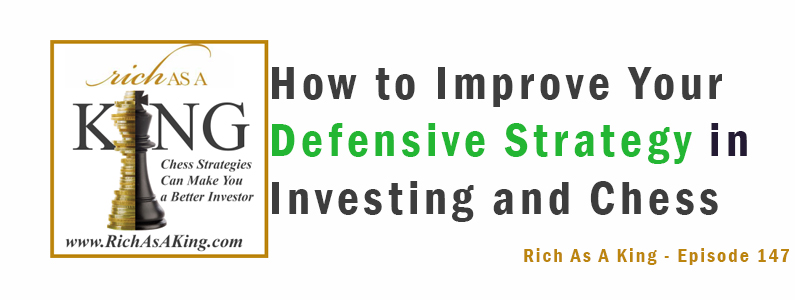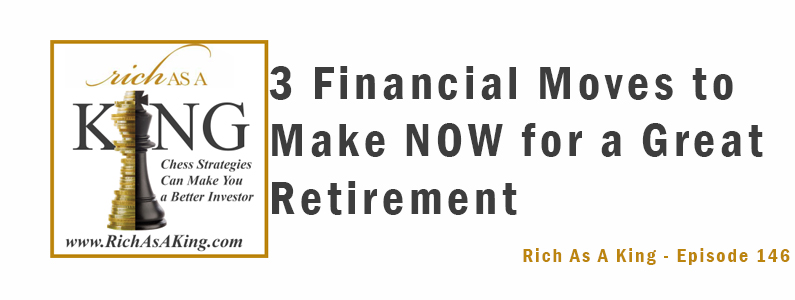
by Douglas Goldstein | Oct 3, 2017 | Chess Strategies, Podcasts, Strategic Thinking |
Do you use a defensive strategy when you play chess or manage your finances? Chess grandmasters use defensive tactics to prevent their opponents from having any chance of successful attack. Listen to this podcast to get tactics you can use to defend your investments, as well as your chess pieces. The opposite of being defensive is being aggressive. Listen to The Goldstein on Gelt Show from 10/2/17 to get the free download “You Don’t Even Know How Aggressive an Investor You Really... Click for more

by Douglas Goldstein | Sep 19, 2017 | Chess Strategies, Financial Plan, Podcasts |
What are three financial moves that you can make now to ensure that you will have a comfortable retirement? Consider basing your financial moves on chess strategies. You can adapt chess maneuvers to put your finances in order and prepare for retirement. Download this financial podcast to learn a how to apply chess moves to your finances. Longer lifespans mean longer retirements. Therefore, in order not to run out of money, it’s critical to prepare properly. For more about preparing for retirement in the “age of longevity,” listen to my interview with Professor Andrew Scott, author of The 100-Year Life: Living and Working in an Age of... Click for more

by Doug Goldstein CFP® | Sep 12, 2017 | Chess Strategies, Decision Making |
One of the most deadly surprise chess tactics to watch out for in a game is the skewer. (Click here to watch a short video about the tactic.) A skewer targets two of your opponent’s pieces that are lined up. Usually, the more valuable of the two pieces flees, allowing the capture of the other one. Very often, this takes place in the form of a surprise attack. If you are extremely vigilant, however, you may be able to prevent this from happening. The same kind of surprise tactic can derail your finances, throwing them into disarray. Stop and think As an investor, you lack the same vantage point that allows chess players to observe every piece on the board. However, in many situations, if you just stop, think, and assess all the possibilities, you may be able to prevent yourself from falling victim to a surprise attack. Here’s an example: What would happen if you didn’t have an emergency fund? You have some savings, but they are in long-term investments that you can’t access in a hurry. One day, unexpectedly, your car breaks down and needs a very expensive repair. What do you do? Without an emergency fund, this huge expense is hard for you to bear. You can’t take the money out of your long-term savings as you need it as soon as possible, and you don’t have enough cash in your current account to cover it either. If you had built an emergency fund gradually, putting a little money aside over the preceding few months and years, you would have been able to cover this repair... Click for more

by Doug Goldstein CFP® | Aug 2, 2017 | Chess Strategies, Financial Strategies |
One very effective, but often overlooked way of saving money is increasing your monthly mortgage payments. The idea of spending money in order to save sounds like a contradiction, but if you look at your bigger financial picture it makes a lot of sense. Here’s why: Remove all obstacles in your path When you play chess, your main objective is to checkmate your opponent. To achieve your goal, you need to find strategies and tactics for removing those obstacles so that you can move forward. Occasionally you might even have to sacrifice a valuable piece to get ahead. In the short term, sacrificing a piece may not seem advantageous, but in the long term a sacrifice may help you win the game. Similarly, in personal finance, you need to eliminate the debts blocking your path towards a comfortable retirement. These debts include credit card balances, bank overdrafts, and also your mortgage. By making larger monthly payments, you can pay off your mortgage more quickly. You actually end up spending more money over the long term if your monthly payments are smaller and the mortgage is spread out over a longer duration. But why is this, if you are borrowing a specific sum of money in both cases? The answer lies in the way that a mortgage is usually built. How does a mortgage work? A mortgage is a loan you pay to the bank with your house as collateral. In America, mortgages usually vary from 10 years to as long as 50 years. The debt that you pay back consists of the principal, or the actual sum that you... Click for more

by Doug Goldstein CFP® | Jul 18, 2017 | Chess Strategies, Financial Strategies |
Applying basic chess tactics to running your finances can help you become a better investor. How? Here are some examples: Look at the whole board One of Grandmaster Susan Polgar’s most important lessons when coaching chess is to “look at the whole board.” In both chess and investing, you need to base your decisions not only on your current situation but also on the big picture. While the squares directly in front of you may seem to be totally clear from any danger, other squares that are slightly further away may be more perilous for you. Similarly, when you make investment decisions, look at the long term as well as at your current situation. Take small steps to success Very often, a game of chess is won through taking small steps rather than through sweeping, dramatic moves. A good strategy is to build up both your attack and defense gradually, accumulating small advantages along the way. Similarly, as an investor, you need to take small steps, such as putting away regular savings and contributing to retirement accounts. When you take small steps to increase savings, you let the magic of compound interest and time work to your advantage. Review your strategy Chess players continually review the tactics and strategies they employ on the board in order to improve their game. In the same way, you should review your finances on a regular basis. Life, like the chessboard, is always in motion, so make sure that your financial plan continues to be relevant for your personal situation. By making regular financial reviews, you’ll have a better grasp as to when... Click for more

by Douglas Goldstein | Jul 11, 2017 | Chess Strategies, Financial Strategies, Podcasts |
What tactics do Warren Buffett and Susan Polgar use when making investing decisions and playing chess? How can an investing tactic be applied to chess, or vice versa? Discover why Warren Buffett says you should invest within your circle of competence and how building a “moat” protects your chess pieces and also the stocks in which you... Click for more










